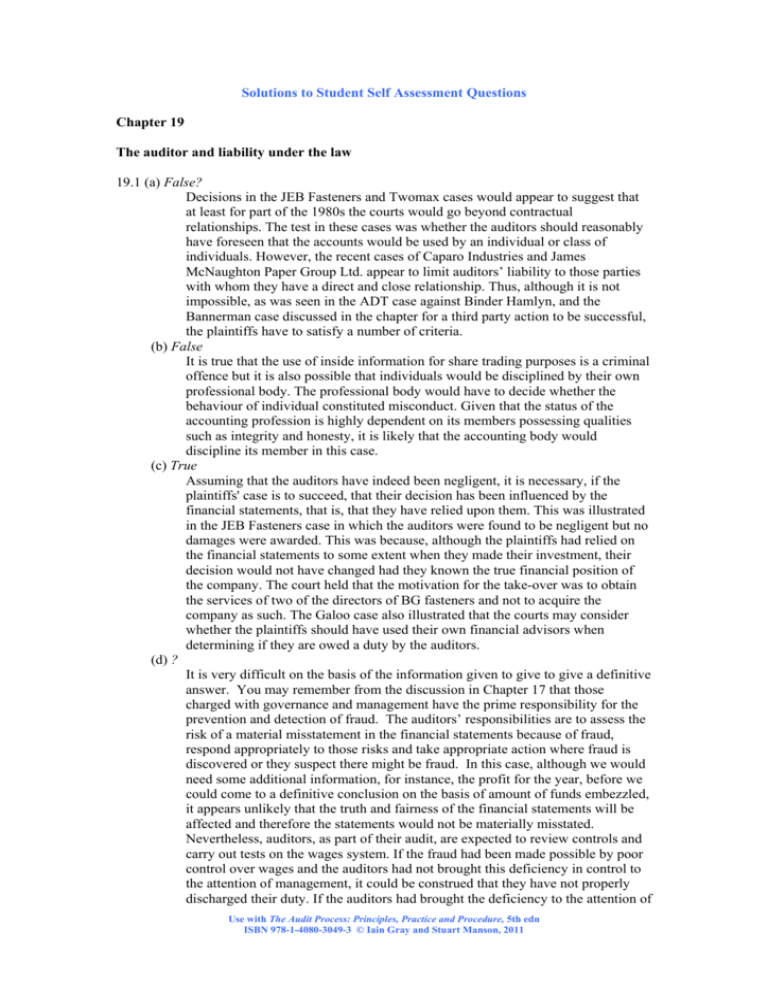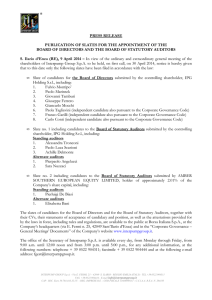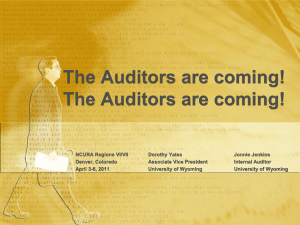Chapter 19
advertisement

Solutions to Student Self Assessment Questions Chapter 19 The auditor and liability under the law 19.1 (a) False? Decisions in the JEB Fasteners and Twomax cases would appear to suggest that at least for part of the 1980s the courts would go beyond contractual relationships. The test in these cases was whether the auditors should reasonably have foreseen that the accounts would be used by an individual or class of individuals. However, the recent cases of Caparo Industries and James McNaughton Paper Group Ltd. appear to limit auditors’ liability to those parties with whom they have a direct and close relationship. Thus, although it is not impossible, as was seen in the ADT case against Binder Hamlyn, and the Bannerman case discussed in the chapter for a third party action to be successful, the plaintiffs have to satisfy a number of criteria. (b) False It is true that the use of inside information for share trading purposes is a criminal offence but it is also possible that individuals would be disciplined by their own professional body. The professional body would have to decide whether the behaviour of individual constituted misconduct. Given that the status of the accounting profession is highly dependent on its members possessing qualities such as integrity and honesty, it is likely that the accounting body would discipline its member in this case. (c) True Assuming that the auditors have indeed been negligent, it is necessary, if the plaintiffs' case is to succeed, that their decision has been influenced by the financial statements, that is, that they have relied upon them. This was illustrated in the JEB Fasteners case in which the auditors were found to be negligent but no damages were awarded. This was because, although the plaintiffs had relied on the financial statements to some extent when they made their investment, their decision would not have changed had they known the true financial position of the company. The court held that the motivation for the take-over was to obtain the services of two of the directors of BG fasteners and not to acquire the company as such. The Galoo case also illustrated that the courts may consider whether the plaintiffs should have used their own financial advisors when determining if they are owed a duty by the auditors. (d) ? It is very difficult on the basis of the information given to give to give a definitive answer. You may remember from the discussion in Chapter 17 that those charged with governance and management have the prime responsibility for the prevention and detection of fraud. The auditors’ responsibilities are to assess the risk of a material misstatement in the financial statements because of fraud, respond appropriately to those risks and take appropriate action where fraud is discovered or they suspect there might be fraud. In this case, although we would need some additional information, for instance, the profit for the year, before we could come to a definitive conclusion on the basis of amount of funds embezzled, it appears unlikely that the truth and fairness of the financial statements will be affected and therefore the statements would not be materially misstated. Nevertheless, auditors, as part of their audit, are expected to review controls and carry out tests on the wages system. If the fraud had been made possible by poor control over wages and the auditors had not brought this deficiency in control to the attention of management, it could be construed that they have not properly discharged their duty. If the auditors had brought the deficiency to the attention of Use with The Audit Process: Principles, Practice and Procedure, 5th edn ISBN 978-1-4080-3049-3 © Iain Gray and Stuart Manson, 2011 management and they have ignored the warnings and suggestions, the accusation that the auditors have been negligent is less well founded. In addition, the auditors in any court case could claim contributory negligence on the part of the client. You will recall that we mentioned this in the case of AWA Ltd v Daniel in the text of this chapter. It should, however, be acknowledged that, if the controls in the wages area are weak, there is some obligation on the auditors to take this into account in designing audit tests and not merely ignore it. It will also be necessary to take into account the nature of the fraud (whether it was ingenious and complex, for instance, involving the alteration of computer programs, or whether it was simple and straightforward). Generally speaking, the more complex the fraud, the less likely it is the auditors would be found to be negligent. It should be noted that the existence of complexities, including complex computer systems, does not in itself limit the auditors' responsibilities. Prior to accepting the audit, they should ensure that they have the necessary skills and resources needed for the assignment. Other features that should be discussed are: a) The problems posed to auditors by managerial fraud. Management are often in a position where they can override controls. b) The length of time the fraud has been going on. Generally, the longer the length of time, the more likely it is that the auditors will be considered to have been negligent. (e) False The Companies Act 2006 (Ss. 534-538) allows the drawing up of a liability limitation agreement which limits the liability of the auditor to the company. However, such an agreement must meet with certain criteria. The agreement must be approved by the members. The terms of the agreement must be such that the liability of the auditors’ liability is not limited to an amount less than would be fair and reasonable. Thus the company and the auditors cannot just make up any agreement that exempts auditor from liability and in that sense the statement as posed is false. If the agreement is approved by the members and it is seen to be fair and reasonable then such an agreement can limit the liability of the auditor to a company 19.2 (a) From the details given it seems highly likely that the auditors have been negligent. Not attending the inventory/stocktake nor circularising trade receivables/debtors, both of which are generally considered to be standard practice, would provide strong evidence of negligence by the auditors. The importance of attending inventory/stocktakes is illustrated by the recent publication (January 2004) by the APB of a Practice Note titled ‘Attendance at Stocktaking’. The omission of both these procedures has been highlighted in case law. In the American case of McKesson and Robbins, a major management fraud involving the over-statement of sales, trade receivables/debtors and inventory/stock, it is very likely that the fraud would have been detected if the auditors had attended the inventory/stocktake and circularised trade receivables/debtors. Although it was common practice at that time (The McKesson Robbins case was heard in 1939) not to carry out the above procedures, it should be noted that following the investigation by the SEC, the American Institute of Accountants (now the American Institute of Certified Public Accountants) issued a statement on Auditing Procedure that required auditors to attend inventory/stocktakes and circularise trade receivables/debtors. Students should also refer to the discussion on the Thomas Gerrard case in chapter 17 and Twomax case in the text of this chapter. The request that certain trade receivables/debtors not be circularised is one occasionally met with in practice and, although the auditors should attempt to Use with The Audit Process: Principles, Practice and Procedure, 5th edn ISBN 978-1-4080-3049-3 © Iain Gray and Stuart Manson, 2011 convince the client that these trade receivables/debtors should be circularised, they should be aware that, occasionally, there may be good reasons for managements' attitude. For instance, the company may be in dispute with certain companies about the amount owed and believe that circularising them would only hinder any settlement between the parties. The auditors should ask why the client does not wish certain trade receivables/debtors to be circularised and should ensure that they are verified using alternative audit tests, such as extended audit work on sales to the trade receivables/debtors, including movement of inventory/stock, examining documentation and cash receipts. It would also be appropriate to examine correspondence with trade receivables/debtors. If these procedures were not carried out it could be further evidence that the auditors have indeed been negligent. (b) The crucial issue would seem to resolve around whether it was reasonable to ignore the provisions in FRS 18 for the items concerned. We emphasised in Chapter 16 that accounting standards should normally be followed unless this leads to the accounts not giving a true and fair view. Company law specifically requires that companies should state whether the accounts have been prepared in accordance with applicable accounting standards and, where there has been a material departure from standards, that particulars be given together with the reasons for the departure. Although ISA 700 does not specifically state that there should be an assessment of the financial effect of any material departure from the standard it would appear reasonable in the interests of the financial statements giving a true and fair view that such an assessment be disclosed. The auditors should assess the reasons for the non-compliance and whether the disclosures are adequate. Furthermore, they will have to decide if the non-compliance results in the financial statements not giving a true and fair view. In this case the auditors appears to have been negligent in not ensuring that there has been adequate disclosure of the departure from FRS 18. It is possible that the lack of explanation of the departure should in itself have led to the accounts being qualified because it impairs the ability of the accounts to give a true and fair view. Therefore, on the basis of the lack of disclosure the auditors would appear to be negligent in respect of their audit work. It would also have to be determined whether in the circumstances departure from FRS 18 was appropriate. Details of the disclosure requirements when a company departs materially from an accounting standard are given in paragraph 62 of FRS 18. Since the need to depart from an accounting standard to give a true and fair view is considered to be relatively rare event the auditors will need to have identified exceptional circumstances which allows noncompliance with FRS 18. We are not given sufficient information in the question to make this judgment but it would appear that the auditors would have an uphill task to prove the correctness of their judgment and that they were not negligent. Leaving aside the issue of the non-disclosure discussed above, a non-justified departure from FRS 18 should lead to a modified opinion. In relation to the issue of going concern there are two main aspects to consider. Firstly, although the audit report contained an explanatory emphasis of matter paragraph about the going concern the adequacy of both the auditors' and the company’s disclosures would need to be assessed. Secondly, it would have to be determined if it was actually appropriate to prepare the accounts using the going concern basis. If either of the above two conditions are not met, this would be evidence that the audit work has been negligently performed. On the basis of the above it would appear that the auditors have been negligent in respect of their audit work. It is important to stress, however, that in audit negligence cases before evaluating the actual work of the auditors, it would have to be determined if they owed Bibbington Ltd a duty of care. This would be decided on the facts of the case using the criteria we discussed in the chapter. For instance, did Bibbington Ltd actually rely on the accounts when making their Use with The Audit Process: Principles, Practice and Procedure, 5th edn ISBN 978-1-4080-3049-3 © Iain Gray and Stuart Manson, 2011 decision and how close was the relationship between the auditors and Bibbington Ltd. (c) You will recall from Chapter 6 that it is normal practice to collect and accept third party evidence. Indeed, we emphasised that evidence originating from outside an organisation is generally regarded as stronger than internal evidence. However, the auditors should not blindly accept evidence as giving absolute proof. This was stressed in the English case of re City Equitable Insurance Co. Ltd. (1925) and the Australian case Pacific Acceptance Corporation Ltd V Forsyth and others (1970). In the former case the auditors accepted certificates relating to loans and securities from a firm of stockbrokers. Although the appeal judge did not consider that this constituted negligence he emphasised that the auditors need to consider the trustworthiness of third parties before relying on any certificate. If there is doubt, the auditors should physically inspect the certificates. Although the judge in the Pacific Acceptance case largely re-iterated the above, he took the view that if the auditors decided not to physically inspect the certificates they should ascertain the reliability of the third parties' system. Thus, in the Gage Ltd example we need to ascertain what procedures the auditors took to determine the trustworthiness of the stockbrokers. If the stockbrokers were a long established firm of good repute with whom the auditors had dealt with over number of years without finding fault, this would provide strong evidence that he or she had not been negligent. Ideally the auditors should perhaps on a rotational basis have physically inspected some of the certificates, assuming it was practicable. Additionally, where possible, the auditors should obtain corroborative evidence. For instance, if the company has an investment in another company, there may be dividends that can be checked by inspecting the dividend warrant and entry in the cash book. 19.3 In general for an action of negligence to succeed against auditors it must be shown: a) that the auditors did not exercise due care and skill b) that a duty was owed to the party bringing the action c) that this party relied on the financial statements and suffered loss because of the auditors' negligence d) it is just, fair and reasonable to impose liability on the defendant We comment as follows: (a) (i) As has been emphasised in the text, adherence to current auditing practice and following auditing standards would be strong evidence an auditor has exercised the necessary care and skill. The issue in this case is the non-attendance by the auditors at the company's inventory/stocktake. It would be normal practice to attend the inventory/stocktake and given the judgements in McKesson and Robbins and the Twomax cases this would suggest the possibility that the auditors had been negligent. (ii) Although the use of analytical review is accepted as an important audit test the fact that inventory was considerably overstated may suggest that the review had not been properly carried out. Given the absence of the inventory/stocktake the auditors should have extended their analytical review and other audit tests. The fact that the inventory figure apparently made sense perhaps highlights the importance of the physical inventory/stocktake. (iii) Although the contractual relationship is between the auditors and company, recent cases have suggested that the auditors' responsibilities may in certain specified and restricted circumstances extend beyond that of the members. Mention should be made of the following cases: Hedley Use with The Audit Process: Principles, Practice and Procedure, 5th edn ISBN 978-1-4080-3049-3 © Iain Gray and Stuart Manson, 2011 Byrne, JEB Fasteners, Twomax, Caparo Industries, ADT v Binder Hamlyn, James McNaughton Paper Group Ltd. v. Hicks Anderson & Co, Andrew and others v Kounnis Freeman and The Royal Bank of Scotland v Bannerman Johnstone Maclay and Others. (iv) It is likely that the courts would lay most stress on the precedent set and judgments in the Caparo and subsequent cases. Thus, since there was no direct relationship between the auditors and the lender, no duty of care would be owed. Although the lender might try and bring the case within the remit of the Bannerman case a feature militating against this is that the question states that the auditors were unaware that the accounts had been used by the company in obtaining finance from a lender. It is likely that this would distinguish this case sufficiently from Bannerman for a court to follow Caparo and deem that a duty of care was not owed by the company to the lender. The firm would need to ensure that it complied with current auditing practice and in particular that it applied auditing standards. Specifically, each audit should be adequately planned, recorded and controlled, sufficient evidence must be acquired, and a competent review must be carried out by the reporting partner. The audit firm should also have quality control procedures. For instance, there should be procedures for adequate and effective review by the engagement partner and, where appropriate, by an independent partner that ensures the audit work complies with the standards and procedures laid down by the audit firm. More generally, the audit firm should follow the requirements of ISA 220 - Quality control for an audit of financial statements. Finally, the audit firm might wish to consider adding a disclaimer paragraph to their audit report. Use with The Audit Process: Principles, Practice and Procedure, 5th edn ISBN 978-1-4080-3049-3 © Iain Gray and Stuart Manson, 2011








